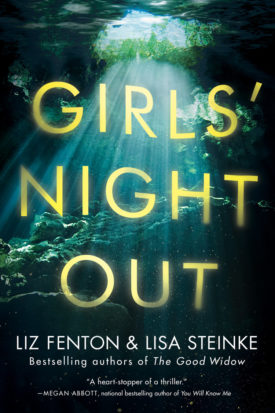 Synopsis:
Synopsis:
Ashley, Natalie, and Lauren were the best of friends for twenty years, but have been estranged for the past year. At Ashley’s urging, they agree to take a trip together in an attempt to heal their friendship. Ashley discovers Tulum, Mexico, a beautiful setting that is also supposedly spiritual and magical. Even after the three are reunited in paradise, however, they’re still not completely honest with each other — about the past, the present, or the secrets they’re hiding.
Ashley disappears on their girls’ night out, leaving Natalie and Lauren to try to piece together their hazy memories and figure out what could have happened to her. Both of them harbor deep feelings of guilt about their last interactions with Ashley.
Ashley had been spending a lot of time with Marco, a man she’d met only days before. Did she leave with him? Was she kidnapped? Could Natalie or Lauren have harmed her?
Hour by hour, Natalie and Lauren’s search rushes headlong into growing suspicion and dread. Maybe their secrets run deeper and more dangerous than one of them is willing — or too afraid — to admit.
Review:

Authors Liz Fenton and Lisa Steinke relate that writing a follow-up to their best-selling The Good Widow wasn’t just challenging. Penning Girls’ Night Out “broke us open, hard and wide, before putting us back together again. Our friendship and our partnership were put to the test in a way we’d never experienced before. . . . We argued. We cried.” Even though they have been friends for thirty years, during the year they worked on Girls’ Night Out, they wondered if the book would ever be completed and published.
The premise of Girls Night Out mirrors their own relationship: Two longtime best friends find their relationship disintegrating when the business they founded together becomes wildly successful. For the authors, life was imitating art but, eventually, as Girls’ Night Out came together, so did their friendship. As a result of their experience, they dedicated the book to friendship.
Friendship is the theme of Girls’ Night Out, the story of three women who have stood by each other for two decades, but find themselves unable to continue doing so. When Natalie invented the BloBrush, a combination blow dryer and hair brush, she and Ashley founded BloMe. Eight years later, and after their appearance on Shark Tank (they didn’t make a deal with a shark because Ashley refused the offer from Lori Greiner), they have a pending buy-out offer from Revlon about which they cannot agree. While Natalie is desperate to convince Ashley to agree to sell in order to solve her family’s financial crisis created by her husband, Ben, Ashley cannot bring herself to give up the company they have worked so hard to establish. Natalie conceals her family’s financial crisis, while Ashley has her own marital troubles and confesses on their first night in Mexico that she is considering leaving her husband, Jason. Natalie and Ashley each have two young daughters.
Their friend Lauren was suddenly widowed a year ago, and Fenton and Steinke reveal early on that the breakdown of Lauren’s relationship with Ashley was related to that event. In the year since her abusive husband’s death, Lauren has established a close friendship with another widow that she met in a support group, but has also taken to drinking too much and engaging in other reckless behavior. She’s confident that neither Ashley nor Natalie comprehend “how you could both love and fear someone, how you could wish to be free but then lament your freedom.” And she has conflicting feelings about her friendship with them, unsure if she wants to walk away for good or work toward reconciliation.
The three women’s friendship has always revolved around Ashley, the undisputed leader and spark of the trio. Female friendships are complicated, often difficult, and frequently steeped in competition. In female friendships, three is a particularly difficult number. Lauren and Natalie have spent their lives vying for Ashley’s attention, competing for her approval, wanting her to like each of them better. As Lauren puts it, “[l]ike two puppies wanting to be adopted by the same person.” Despite the problems in their relationships, during a trip designed by Ashley to help them find redemption, forgiveness, and renewal, it is clear that nothing has changed. Natalie and Lauren are so self-involved that they continue competing for Ashley’s favor, not recognizing that Ashley is lost and confused, and desperately seeking peace and clarity.
After a night of drinking, Natalie wakes up on the beach alone, rather than in the hotel room she shares with Ashley . . . and with no memory of how she got there. Worse, when she goes to their room, Ashley is not there and not answering her cell phone or responding to text messages. Together with Lauren, Natalie commences a frantic search to find Ashley — and regain her memory of exactly what happened the prior night. She questions what kind of behavior she is capable of.

In order to enjoy Girls’ Night Out, readers must suspend their disbelief and accept that educated, successful women are capable of making impetuous, risky choices. In that respect, Girls’ Night Out is deeply disturbing. In Ashley’s case, her first bad choice is taking up with Marco, a charming and handsome local she meets in a yoga class who claims to own a smoothie stand. He talks about spirituality, capitalizing on Ashley’s evident vulnerability, convincing her to engage in outrageously impulsive behaviors designed to help her let go, and find clarity and contentment. Concerned that Marco is a skilled conman, Natalie and Lauren end up going along in order to protect Ashley, as well as gain her favor, but not without rancor. After all, the three of them came to Mexico to spend time together in an attempt to heal their relationship and Ashley appears to be more interested in wasting time with Marco.
How had both of their lives turned upside down without the other one noticing? What did that say about them? That their friendship would disintegrate so easily when pressure was applied?
Additionally, readers must establish an emotional connection to three deeply flawed, self-absorbed characters. Fortunately, that’s easier to do. Ashley, Natalie, and Lauren are all women who, at forty years of age, don’t yet understand the depth of their own resilience and power, much less how to effectively wield that power. They have all experienced great successes and failures — the latter in their marriages and other personal relationships — but are teetering on the edge of survival. For the past year, instead of leaning on and drawing strength from each other and their shared histories, they have all been turning inward for answers, but not finding them. The status of their relationships demonstrate that they are much poorer for having done so. The dramatic tension in the story is focused upon whether they can re-establish their bond while there is still time to do so.
Fenton and Steinke explore the friendships of Ashley, Natalie, and Lauren in a surprisingly satisfying manner, despite the patently ridiculous backdrop for the tale. The story is told from the perspective of each woman, detailing her struggle over the course of the previous year that has led her to the Mexican reunion and an examination of her feelings about reconciliation — her anger, resentment, and grief about the various aspects of her life that have proven disappointing and heartbreaking. As the search for Ashley continues and Natalie’s memories come flooding back, horrible, unchangeable truths are revealed.
Readers will likely question the manner in which Fenton and Steinke opt to resolve the mystery of Ashley’s disappearance and the story’s conclusion long after they read the last page. And perhaps that’s their intent because despite its imperfections, Girls’ Night Out delivers an emotional impact, and the characters’ relationships and journeys provide plenty of material for vigorous discussion.
But back to that dedication . . . Fenton and Steinke, because of their own experiences, remind us that friendship is a thing that is both “delicate and strong. That is worth fighting for.” And that, in order to maintain relationships that matter to us, we must really listen to each other and “never be afraid to utter those two magical words: I’m sorry.” That’s the overriding message and real power of Girls’ Night Out. And for that reason, it’s worth reading.






Comments are closed.